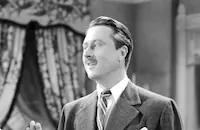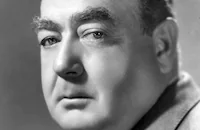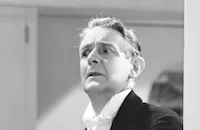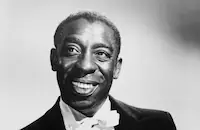Heaven Can Wait

Brief Synopsis
Cast & Crew
Ernst Lubitsch
Gene Tierney
Don Ameche
Charles Coburn
Marjorie Main
Laird Cregar
Film Details
Technical Specs

Synopsis
Upon the death of seventy-year-old Henry Van Cleve, a member of New York's social elite, he resigns himself to being sent to Hell and goes there directly. When he arrives, however, he is greeted by His Excellency, a well-dressed gentleman who demands to know what crimes Henry has committed that would justify his internment in Hell. Replying that the best way to relate the story of his life is to describe the women in it, Henry begins his tale: When he was born in 1872, Henry's mother Bertha and grandmother spoiled him constantly, and as he grew, he quickly began to notice the opposite sex. One day, young Henry shows little Mary a beetle, and as she sweetly persuades him to give her another beetle, Henry realizes, "If you want to win a girl, you have to have lots of beetles." The wealthy Van Cleve family, headed by Henry's indulgent father Randolph and his high-spirited grandfather, provide Henry with every luxury, including a maid to tutor him in French when he is fourteen years old. The lovely "Mademoiselle" is soon tutoring Henry in the ways of champagne and romance, until the morning of his fifteenth birthday, when his aghast parents find their son too hung-over to celebrate. Grandfather chuckles and whisks Mademoiselle out of the house before Randolph and Bertha can punish her. Henry's life as a happy-go-lucky drinker and skirt-chaser continues until his twenty-sixth birthday. That morning, Henry confesses to his mother that he has met the girl of his dreams and would gladly marry her, if only he knew her name. In the evening, Henry attends the dinner party celebrating the engagement of his stuffy, proper cousin Albert and his beautiful fiancée, Martha Strabel. Henry is overwhelmed by the sight of Martha, for she is the girl he fell in love with the previous day during a chance meeting at a bookstore. Henry presses his suit, and Martha, who is marrying Albert only to escape the Kansas home of her rich meatpacker parents, admits that she returns Henry's love. The couple elope that night, and Grandfather finances their honeymoon when the horrified Strabels disown Martha. Ten years later, on the day before Martha and Henry's anniversary, which is also Henry's thirty-sixth birthday, Henry is having breakfast with their son Jack when he receives a telegram from Martha, announcing that she has left him. Henry follows Martha to the Strabels' home in Kansas, where her parents have reluctantly reconciled with her. Albert, who met Martha on her train journey, tells her that he still loves her, although Martha barely listens to his declarations. Upon Henry's arrival, Martha reveals that she is aware of Henry's continued philandering, but his charm and Grandfather's determination convince her to forgive her errant husband and the couple "elope" again. Henry and Martha settle down happily as the years pass, until Henry grows worried about Jack's attachment to a chorus girl named Peggy Nash. Henry visits Peggy, who accepts his offer of $25,000 to leave Jack alone. Jack, who has been spoiled just as Henry was, has already tired of Peggy, however, and announces that he has a new girl friend. That night, Martha tells Henry that she likes the look of him now that he is fifty, for his slight potbelly means that he is no longer a Casanova. Later, at a party celebrating the couple's silver anniversary, Henry learns that Martha is ill, and they dance their last dance together. By the time he turns sixty, widower Henry has returned to his fun-loving ways. Jack, who has settled down and become a responsible businessman, despairs that his father stays out late every night, but a reminder of Martha prompts Henry to rescind his request for a young, female reading companion. Ten years later, on Henry's seventieth birthday, a visiting doctor warns Jack and his wife to watch the ailing old man's diet. In his bedroom, Henry wakes up from a dream about dancing with a beautiful blonde woman in a sea of whiskey and soda, then dies while the night nurse, a beautiful blonde, takes his temperature. Having completed his story, Henry is told by His Excellency that they do not cater to "his class of people" in Hell, and that he should apply elsewhere. Henry protests that he will not be admitted, but His Excellency assures him that someone special is waiting for him, and that she will be happy to plead his case.

Director

Ernst Lubitsch
Cast

Gene Tierney

Don Ameche

Charles Coburn

Marjorie Main

Laird Cregar

Spring Byington

Allyn Joslyn

Eugene Pallette

Signe Hasso

Louis Calhern
Helene Reynolds
Aubrey Mather
Michael Ames

Leonard Carey

Clarence Muse

Dickie Moore

Dickie Jones
Trudy Marshall

Florence Bates
Clara Blandick
Anita Bolster
Alfred Hall
Grayce Hampton
Gerald Oliver Smith
Nino Pipitone Jr.
Claire Dubrey
Maureen Roden-ryan
Doris Merrick

Charles Halton

James Flavin
Arthur Foster
Libby Taylor
Bernice Pilot
Michael Mclean
Edwin Maxwell

Scotty Beckett
Marlene Mains
Gerald Pierce
Crew
James Basevi
Edward Cronjager
Gus Edwards
Wayne Forrest
Leland Fuller
William Goetz
Eugene Grossman
Roger Heman
Renè Hubert
Georges Jomier
Natalie Kalmus
Franz Lehár
Thomas Little
Alfred Newman
Guy Pearce
Samson Raphaelson
Walter M. Scott
Fred Sersen
Harry B. Smith
Ted Snyder
Dorothy Spencer
Henry Weinberger
Francis Wheeler

Videos
Movie Clip




Hosted Intro
Film Details
Technical Specs

Award Nominations
Best Cinematography
Best Director
Best Picture
Articles
Heaven Can Wait (1943)
Then again, this is Ernst Lubitsch we are talking about. He did not make movies like everyone else.
Although a "character study," Heaven Can Wait is the life story of nobody in particular. Citizen Kane and The Great McGinty fulminate over the accomplishments of Great Men (with capital letters). Lubitsch, as he put it, set forth "a man only interested in good living with no aim of accomplishing anything or doing anything noble."
Lubitsch admitted that he faced studio opposition to making a movie that "had no message and made no point whatsoever." But he defended his choices, saying, "I hoped to introduce to a motion picture audience a number of people, and if the people should find them likeable--that should be sufficient for its success."
To play those "number of people," Lubitsch was restricted to the roster of somewhat lackluster stars under contract to 20th Century Fox, instead of the performers with whom he had built his reputation. Lubitsch reluctantly screen-tested Don Ameche for the lead role, and complained to screenwriter Sam Raphaelson "we are in trouble." Raphaelson was baffled by this--Ameche's screen test was terrific, he thought. Lubitsch agreed--Ameche had nailed it. That was the problem--now he was obliged to use Ameche, in a role he'd written with Fredric March in mind.
Under Lubitsch's direction, Ameche gave one of his career-defining performances, as the lecherous rogue Henry Van Cleve. The film covers Van Cleve's life, from birth to death (not necessarily in that order), by focusing on the women in it--his mother, the French maid who seduced him at thirteen, the various showgirls that invariably caught his eye, and so on. But of these women, one stands apart--his wife and soul-mate Martha (Gene Tierney), with whom he stays married--if not wholly faithful--for 25 years.
Tierney had not yet achieved her breakout role in Laura (1944). She was highly regarded for her beauty, but as an actress had a reputation for glassy-eyed diffidence. Lubitsch demanded more from her than she was accustomed to giving--and to inspire a fierier, lustier performance from her, he badgered and berated her to the point of tears. Tierney accused Lubitsch of being a "tyrant," and ordered him to stop shouting at her all the time. "I'm paid to shout at you!" was his response.
Whatever on-set tension may have existed between the director and his leading lady, the production sailed through on a modest budget and a short, efficient schedule. Raphaelson called it a "three-haircut picture," in that it only took Lubitsch the length of three haircuts to make it. Lubitsch only spent $1.1 million on the film--remarkable, considering he had the same budget on his previous film, To Be or Not to Be (1942), which wasn't in color and didn't encompass some seventy years worth of settings and fashions.
Lubitsch felt the key to working so efficiently on-set was in the preparation--specifically in the writing. Having bought the rights to Lazlo Bus-Feketé's 1934 play Birthdays, Lubitsch engaged his favorite screenwriter Raphaelson to hunker down with him at Lubitsch's home to adapt the play into a movie.
It took Lubitsch and Raphaelson months to craft their screenplay. Raphaelson said that during that time, studio chief Darryl Zanuck asked how things were coming along. "Vell, I tell you--slow but good," Lubitsch replied. Zanuck smiled, "That's fine. The only thing I'd rather hear than that is--slow and great!" Raphaelson marveled at the seeming indulgence from Zanuck, but Lubitsch explained, "Dis time ve are spending here, writing, is de cheapest time ve got. All ve are paying now is your salary and mine. But the minute ve are on de set, ve are paying de stars, de dis, de dat, ve are paying $50,000 a day..."
The long gestation period for the script was partly Lubitsch's way of escaping the ugliness and acrimony of his divorce from Vivian Lubitsch, a way of taking the pain of that part of his life and turning it into something positive--Vivian accused Ernst of being a childish kind of man, fixated on his own appetites and unconcerned with the effects of those choices on the people around him, so Ernst went and made a movie celebrating those very characteristics.
Raphaelson described it as "a series of animated tintypes, poking sly fun at the manners, decorations and naughtiness of the gay nineties, the locale moving, in a vein of fantasy, from Hades to old New York and Kansas as the career of a mild Casanova is traced."
The character of Henry Van Cleve was conceived as a man "fifteen years ahead of his time, all the time," in terms of sexual mores. In other words, his behavior is only scandalous in terms of the attitudes of the people immediately around him, but not fundamentally scandalous. Time marches on, and forgives him, repeatedly.
Henry Van Cleve passes his final hours with a great meal ("I ate everything the doctor forbade!") and fantasies of a lovely blonde sneaking into his bedroom. Although he had no way to know it at the time, in just four years' time, Ernst Lubitsch would spend his own final hours under strikingly similar circumstances.
Standing in front of the Devil, recounting the long uninterrupted misdemeanor of his life, Henry finds that even Hell isn't interested in his transgressions. His sins don't count as sins. Through the vehicle of this film, Lubitsch presents his own case in its most extreme caricature--a man motivated only by sex and food and pleasure--and granted himself redemption.
By David Kalat
Sources:
Scott Eyman, Ernst Lubitsch.
Herman G. Weinberg, The Lubitsch Touch.
William Paul, Ernst Lubitsch's American Comedy.
Leland A. Poague, The Cinema of Ernst Lubitsch.

Heaven Can Wait (1943)
Heaven Can Wait (1943) - HEAVEN CAN WAIT - The 1943 Ernest Lubitsch Comedy Classic on DVD
Ernst Lubitsch's Heaven Can Wait (1943) is one of the more unusual marriage comedies of the studio era, depicting a couple's relationship across the decades. Indeed, the passing of time and the effect it has on the film's characters is one of the main underlying themes, and it connects nicely with Lubitsch's nostalgic vision of the past. The photography and turn-of-the-century production design, though lavish, never overwhelm the film's comedy but add a wholly appropriate burnish. Don Ameche perfectly embodies the sly charms of Henry Van Cleve in what must surely be his greatest role.
Being made in 1943, Heaven Can Wait lacks some of the naughty innuendo of Lubitsch's pre-Code films such as Trouble in Paradise (1932), but it moves far beyond that Art Deco fantasy world to sketch out a gently mocking, yet complex character portrait. In its warmth and humaneness it recalls The Shop Around the Corner (1940), which is to say it's one of Lubitsch's richest and most moving films. I would argue that these two films, together with To Be Or Not To Be (1942), represent the true peak of Lubitsch's career, as much as I love his films from the silent era up to the early Thirties.
Thankfully, however, Heaven Can Wait is not entirely devoid of innuendo--perhaps the biggest laughs come from the section detailing the young Henry's dalliance with the family's French maid, Yvette Blanchard (Signe Hasso). At one point she says to Henry, "Your soul is bigger than your pants." The film's comedy extends to the musical quotations on the soundtrack, among them "By the Light of the Silvery Moon," "The Merry Widow Waltz" and "Home on the Range." The later represents the corn-fed, irascible Strables, and its use is surely ironic given that one of the song's lines is "...and the skies are not cloudy all day"--the Strables' ranch is under a constant deluge of rain. Another highlight is a spirited performance by Charles Coburn as the grandfather Hugo Van Cleve. Coburn has become one of my favorite character actors of the studio era; in films such as this, The Devil and Miss Jones (1941), and The More the Merrier (1943), Coburn was far more than just one of so many Hollywood eccentrics, always waiting off camera to trot out his carefully cultivated crazy routine. In his best films Coburn brought a sense of humaneness and wisdom to his performances, thus adding not just to the film's comedy, but also to its emotional resonance. A tip of the hat to Mr. Coburn.
The Criterion DVD has a resplendent color transfer that shows off the film's production design to the best advantage. It's as clean and bright as possible with extremely little color fringing, an artifact common on Technicolor prints due to misalignment of the color layers. In a couple places the elements are apparently dupes and thus not as sharp, but any such caveats run the risk of making the transfer sound less stellar than it actually is. Extras include: a conversation with critics Molly Haksell and Andrew Sarris; a Bill Moyers interview with screenwriter Samson Raphaelson; an audio-only seminar with Raphaelson conducted by Richard Corliss in 1977, recordings of Lubitsch at the piano, and the theatrical trailer. For Eric Benchley fans, the trailer includes clever voiceover commentary by him.
Heaven Can Wait is a very special film; frankly, I can't imagine any one not liking it. Criterion's DVD edition is a must-have.
For more information about Heaven Can Wait, visit The Criterion Collection. To order Heaven Can Wait, go to TCM Shopping.
by James Steffen
Heaven Can Wait (1943) - HEAVEN CAN WAIT - The 1943 Ernest Lubitsch Comedy Classic on DVD
Quotes
If you meet our requirements, we'll be only too glad to accomodate you. Would you be kind enough to mention, for instance, some outstanding crime you've committed?- His Excellency
Crime? Well, I'm afraid I can't think of any. But I can safely say that my whole life was one continuous misdemeanor.- Henry Van Cleve
In your papa's time, papa kiss mama and then marry. But this is 1887! Time of bicycle, the typewriter has arrive, soon everybody speak over telephone, and people have new idea of value of kiss. What was bad yesterday is lot of fun today. There is a wonderful saying in France: "Les baisers sont comme des bonbons qu'on mange parce qu'ils sont bons." This mean: "Kiss is like candy. You eat candy only for the beautiful taste, and this is enough reason to eat candy."- Mademoiselle
You mean I can kiss a girl once...- Henry Van Cleve
Ten times! Twenty times! And no obligation.- Mademoiselle
I didn't want to be an old maid. Not in Kansas!- Martha
Oh, Henry, I know your every move. I know your outraged indignation. I know the poor weeping little boy. I know the misunderstood, strong, silent man, the worn-out lion who is too proud to explain what happened in the jungle last night.- Martha
Trivia
Notes
The working title of this film was Birthday. An English translation of Lazlo Bus-Feketes' play, also entitled Birthday, opened in New York on December 26, 1934. According to a May 20, 1942 Los Angeles Examiner news item, Ginger Rogers was considered for the leading female role, and on November 25, 1942, Hollywood Reporter noted that producer/director Ernst Lubitsch was in talks with Joseph Cotten to play the role of "Henry Van Cleve." According to a modern source, Lubitsch and Samson Raphaelson wrote the part for either Fredric March or Rex Harrison, but studio production chief Darryl F. Zanuck asked Lubitsch to test Don Ameche. Studio publicity releases announced in early 1943 that Reginald Gardiner was originally set for the part of "Albert Van Cleve," and Frank Orth was to play "a loquacious taxi driver." Contemporary sources reveal that Simone Simon was cast in the part of "Mademoiselle," but, according to a February 4, 1943 Hollywood Reporter news item, Simon left the picture after her demands to have her part expanded and her name billed higher in the cast list were not met. Signe Hasso was borrowed from M-G-M to replace Simon, and actress Spring Byington was also borrowed from M-G-M for the production. Although studio publicity lists include Robert Michael Chambers in the role of "Henry Van Cleve" as an infant, and a Hollywood Reporter news item includes Gretl Dupont in the cast, their appearance in the completed picture has not been confirmed.
According to a June 25, 1943 Hollywood Reporter news item, Twentieth Century-Fox president Spyros Skouras believed that the picture was "one of the most important films ever to be released by the organization." Heaven Can Wait, which was Lubitsch's first production for Twentieth Century-Fox and his first film in Technicolor, received Academy Award nominations for Best Picture, Best Cinematography (Color) and Best Direction. In 1946, Don Ameche noted in The Saturday Evening Post's "The Role I Liked Best" column that the role of "Henry Van Cleve" was his favorite to date because, "in both the time and the emotional sense," it had "greater scope than any other picture I have played in." On October 10, 1943, Ameche and Maureen O'Hara starred in a Lux Radio Theatre broadcast of Heaven Can Wait. Modern sources include Claire James, Roseanne Murray, Marion Rosamond, Adele Jergens and Ruth Brady in the cast as Ziegfeld girls.

Miscellaneous Notes
Released in United States 1943
Released in United States on Video March 1, 1990
Released in United States March 1977
Released in United States March 1979
Released in United States 1943
Released in United States on Video March 1, 1990
Released in United States March 1979 (Shown at FILMEX: Los Angeles International Film Exposition (FilmEssay: Misappreciated American Films) March 14-30, 1979.)
Released in United States March 1977 (Shown at FILMEX: Los Angeles International Film Exposition (Treasures from UCLA Archives) March 9-27, 1977.)














